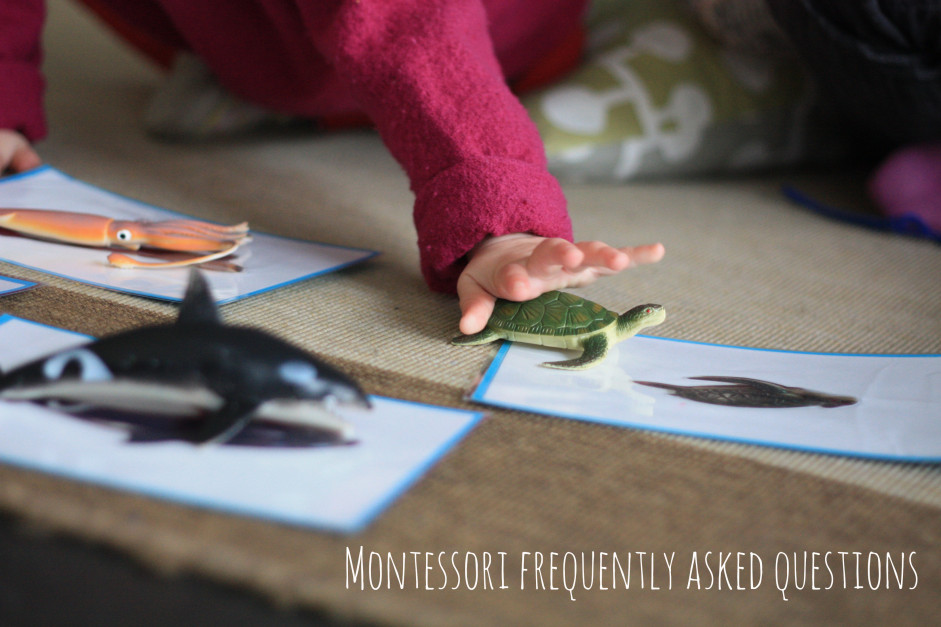Here is the final instalment of our Montessori FAQs. Feel free to drop to contact me with any other questions you have and we can always put together a bonus instalment.
1. I’ve heard Montessori schools are very strict and children are not allowed to play around. Is that true?
There are indeed rules in Montessori classrooms, however, there should be just enough rules so everyone can get along, and not too many that children feel constrained. An example of a rule would be, we wait for another child to finish before taking an activity. Within these rules the children have a lot of freedom to choose which activities they would like to complete, with whom, when, and how.
I think the criticism that Montessori children are not allowed to play around comes from the fact that all the materials and activities in the classroom have been carefully designed for the children to master a specific skill. For example, the watering can is to be used for watering the plants rather than filling buckets, or general water play. However, in practice, there are times when the child is exploring the use of the watering can in another way and is in deep concentration. Then the Montessori teacher can observe and make a mental note to show the child how to water plants the next time. We don’t want to stifle the child’s creativity so we choose another time to teach this (rather than correcting them), and then they also learn how to use the watering can in an appropriate way.
This principle is summarised by “Teach by teaching, not by correcting”.
2. So why choose a Montessori school?
These are the reasons I recommend Montessori schools to other parents:
1. The respect the teacher has for the child – as an equal, as a co-discoverer, as a guide.
2. The Montessori method follows the rhythm of the child – all children work at their own pace because children all learn at different paces and have different strengths and weaknesses.
3. Natural learning vs traditional ‘forced’ learning – rather than the teacher standing at the front of the class telling the children what they need to know, the children are free to explore and make discoveries for themselves in a natural way.
4. Hands on understanding of the world with concrete materials – I think my favourite thing about the Montessori approach is the way that the children learn for themselves, through touching, exploring and working with beautiful concrete materials.
5. Testing in traditional schools can limit creativity and make children lose their love of learning – as the teacher knows where each child is up to, there is little need for standardised testing in Montessori schools.
3. Where can I find a list of Montessori schools?
For those of you in Amsterdam, you can find a listing of Montessori primary schools on our website here: http://www.jacarandatreemontessori.nl/resources/montessori-primary-schools-in-amsterdam/.
In the rest of the Netherlands, a good place to start is the Nederlanse Montessori Vereniging: http://www.montessori.nl/25/scholenlijst.html
In the UK, there is a listing of AMI schools here: http://www.montessorisociety.org.uk/parents/schools-uk
In the USA, you can use this map to find AMI schools near you: http://amiusa.org/school-locator-2/
In Australia, try the Montessori Australia website here: http://montessori.org.au/schools/schools.lasso
For other countries, you can google the city, Montessori, and AMI to find a local school to you.
Bonus question: Why don’t Montessori schools have homework?
We believe that homework is not necessary in a Montessori approach.
1. The children complete the same amount of work in primary school without homework. My son has found that the first year of high school was a lot of revision for him and his Montessori friends as they have to make sure children from different schools were up to the same level. In the Netherlands, in September 2013, Dutch Montessori schools outperformed traditional schools: http://www.dutchnews.nl/news/archives/2013/09/montessori_pupils_perform_best.php
2. Children have time to be kids in the afternoons after being in school all day.
3. The materials are on the shelves in the classroom so it would be difficult to set homework.
Not only do the children enjoy not having homework, the parents enjoy it too. No need to stress about getting homework done, or having to help. A nice bonus I think.
I hope you have found this series useful. Let me know if you have any other questions about the Montessori approach.
